-
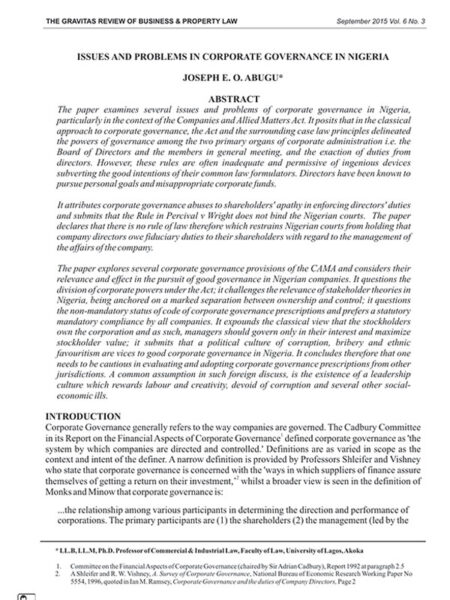
Issues and Problems in Corporate Governance in Nigeria
0₦2,500.00Joseph Abugu, Professor of Commercial and Industrial Law, University of Lagos, Akoka, in his article “Issues and Problems in Corporate Governance in Nigeria” examines the problem of Corporate Governance in Nigeria and argue that in an environment of corruption, bribery and ethnic favouritism, adopting corporate governance codes informed by experiential evolution of other cultures could be counterproductive.
-
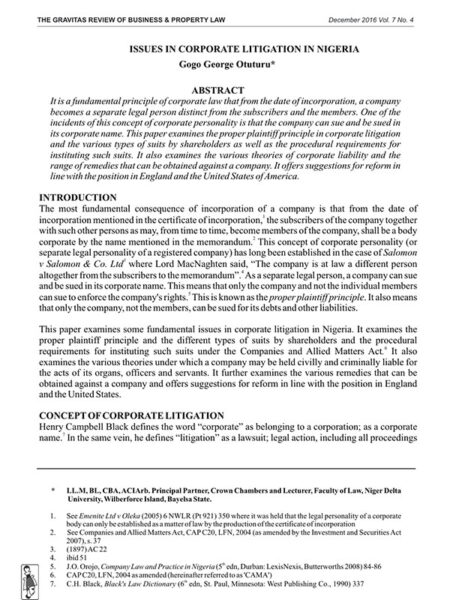
Issues in Corporate Litigation in Nigeria
0₦2,500.00Gogo Otuturu of the Faculty of Law, Niger Delta University, Wilberforce Island, Bayelsa State in his article “Issues in Corporate Litigation in Nigeria” examines a myriad of issues in corporate litigation including theories of corporate liability, the proper plaintiff principle, personal, representative and derivative actions by shareholders, pre-action notice and limitation period.
-
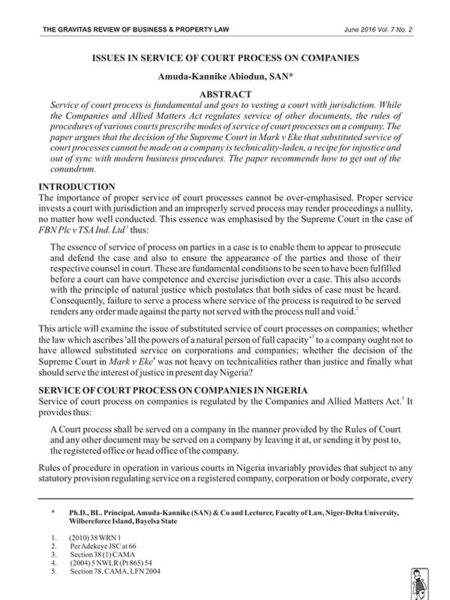
Issues in Service of Court Process on Companies
0₦2,500.00Dr Abiodun Amuda-Kannike SAN, Principal, Amuda-Kannike (SAN) & Co and Lecturer, Faculty of Law, Niger-Delta University, Wilberforce Island in his article, “Issues in Service of Court Process on Companies” examines the provision of the Companies and Allied Matters Act and various Rules of Court on service of court processes on companies. He bemoans the decision of the Supreme Court in Mark v Eke, that substituted service of court processes cannot be made on a company, as technicality-laden, a recipe for injustice and out of sync with modern business process.
-
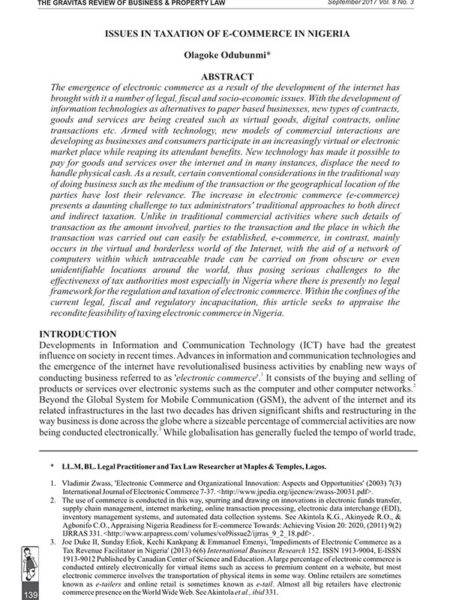
Issues in Taxation of E-Commerce in Nigeria
0₦2,500.00Olagoke Odubunmi, Legal Practitioner and Tax Law Researcher at Maples & Temples, in “Issues in Taxation of E-Commerce in Nigeria”, argues that the main difficulty that electronic commerce poses for the Nigerian tax system stems from the fact that extant national laws governing income taxation are premised on the assumptions of physical presence of parties to business transactions. With the need for physical presence removed or diminished in e-commerce, there is a problem of how to determine the right to tax profits that are derived, with same having intrinsic implications for the full realisation of income tax revenues. Within the confines of the current legal, fiscal and regulatory incapacitation, Odubunmi appraises the challenge of taxing e-commerce in Nigeria.
-
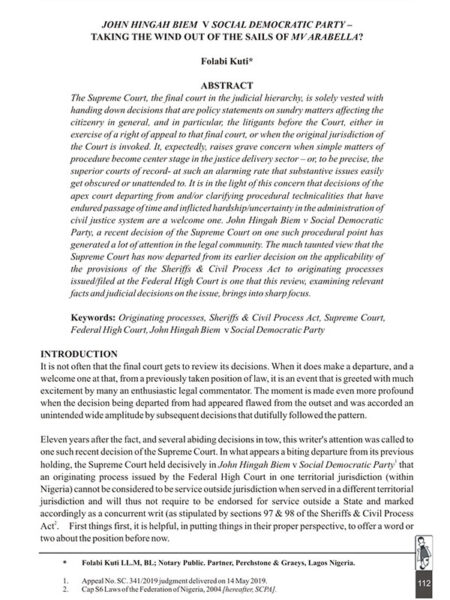
John Hingah Biem v Social Democratic Party – Taking the Wind Out of the Sails of MV Arabella?
0₦2,500.00Folabi Kuti, Partner, Perchstone & Graeys Lagos Nigeria in John Hingah Biem v Social Democratic Party – Taking the winds out of the sails of Arabella? analyses the recent decision of the Supreme Court in John Biem. He considers whether the apex court has indeed departed from its earlier decision in MV Arabella on the applicability of the provisions of the Sheriffs & Civil Process Act to originating processes issued/filed at the Federal High Court.
-
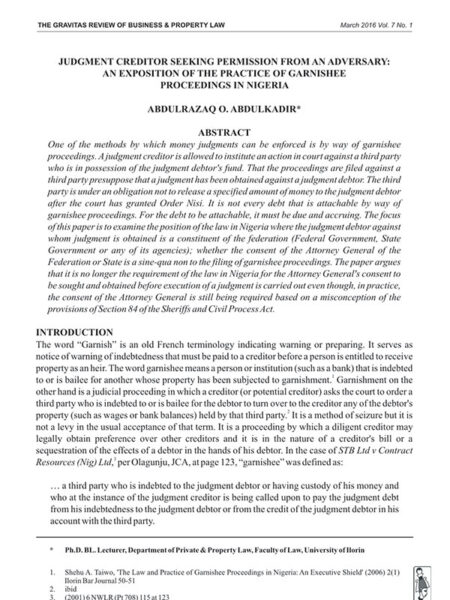
Judgement Creditor Seeking Permission from an Adversary: An Exposition of the Practice of Garnishee Proceedings in Nigeria
0₦2,500.00Dr Abdulrazaq Abdulkadir of the Department of Private & Property Law, University of Ilorin in his article “Judgment Creditor Seeking Permission from an Adversary: An Exposition of the Practice of Garnishee Proceedings in Nigeria” examines the practice of courts requiring judgment creditors seeking to file garnishee proceedings against the government to seek the consent of the Attorney General. He argues that the practice is against the provision of the 1999 Constitution and may be a result of a misconception of the implications of Section 84 of the Sheriffs and Civil Process Act.
-
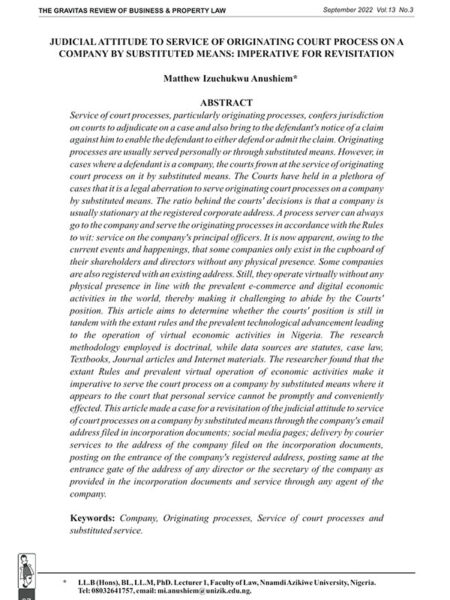
Judicial Attitude to Service of Originating Court Process on a Company by Substituted Means: Imperative for Revisitation
0₦2,500.00Dr Mathew Anushiem of the Faculty of Law, Nnamdi Azikiwe University, Nigeria, in his article, Judicial Attitude to Service of Originating Court Process on a Company by Substituted Means: Imperative for Revisitation, explains that the service of court processes, particularly originating processes, confers jurisdiction on courts to adjudicate on a case and also bring to the defendant’s notice of a claim against him to enable the defendant to either defend or admit the claim. Originating processes are usually served personally or through substituted means. However, in cases where a defendant is a company, the courts frown at the service of originating court process on it by substituted means. The ratio behind the courts’ decisions is that a company is usually stationary at the registered corporate address. A process server can always go to the company and serve the originating processes in accordance with the Rules to wit: service on the company’s principal officers. Given current happenings, the nature of some businesses and technological advancement, Dr Anushiem posits that there is the need to revisit the Rules and judicial attitude to bring them in tandem with modern trends.
-
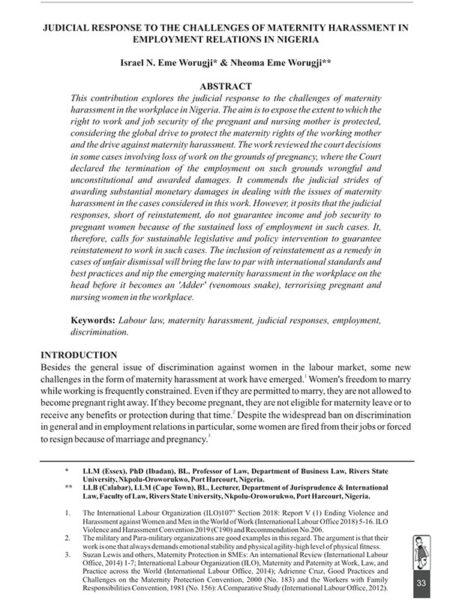
Judicial Response to the Challenges of Maternity Harassment in Employment Relations in Nigeria
0₦2,500.00Professor Israel Worugji & Nheoma Worugji in their article, Judicial Response to the Challenges of Maternity Harassment in Employment Relations in Nigeria, revisit the issues of maternity harassment in the workplace. Their contribution explores the judicial response to the challenges of maternity harassment in the workplace in Nigeria. The aim is to expose the extent to which the right to work and job security of the pregnant and nursing mother is protected, considering the global drive to protect the maternity rights of the working mother and the drive against maternity harassment in particular. The work reviewed the court decisions in some cases involving loss of work on the grounds of pregnancy, where the court declared the termination of the employment on such grounds wrongful and unconstitutional and awarded damages. It commends the judicial strides of awarding substantial monetary damages in dealing with the issues of maternity harassment. However, it posits that the judicial responses, short of reinstatement, do not guarantee income and job security to pregnant women because of the sustained loss of employment in such cases. It, therefore, calls for sustainable legislative and policy intervention to guarantee reinstatement to work in such cases.
-
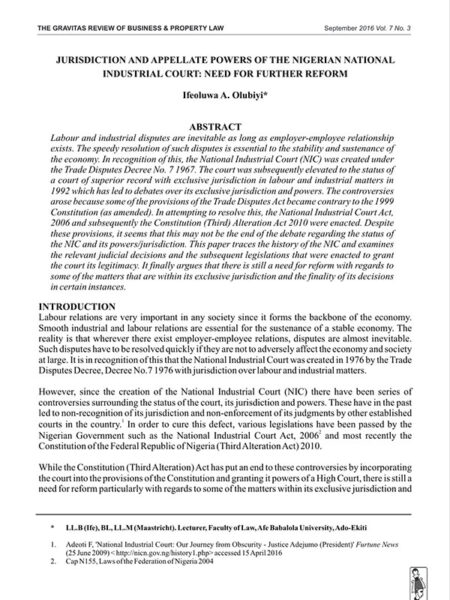
Jurisdiction and Appellate Powers of the Nigerian National Industrial Court: Need for Further Reform
0₦2,500.00Ifeoluwa Olubiyi, Lecturer, Faculty of Law, Afe Babalola University, Ado-Ekiti, in her article “Jurisdiction and Appellate Powers of the Nigerian National Industrial Court: Need For Further Reform” undertakes an historical analysis of the jurisdiction and status of the National Industrial Court as a court of record. She posits that while the Constitution of the Federal Republic of Nigeria (Third Alteration) Act 2010 may have put an end to some of the controversies surrounding the jurisdiction of the court, the finality of its decision, ‘exclusive jurisdiction’ in child labour, child abuse and human trafficking cases, and application of international treaties without domestication may be contrary to other sections of the Constitution.
-
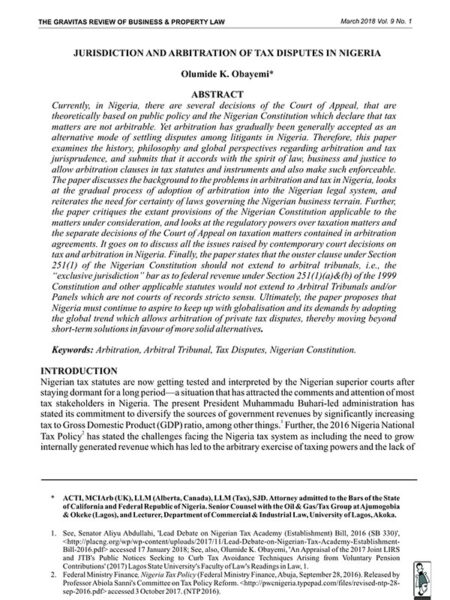
Jurisdiction and Arbitration of Tax Disputes in Nigeria
0₦2,500.00Dr. Olumide Obayemi, of the Department of Commercial & Industrial Law, University of Lagos, and of & Okeke, in his article, “Jurisdiction and Arbitration of Tax Disputes in Nigeria” observes that currently, based on public policy and the Constitution, tax matters are not arbitrable. He examines the history, philosophy and global perspectives regarding arbitration and tax jurisprudence, and submits that it accords with the spirit of law, business and justice to allow arbitration clauses in tax statutes. He reviews the decisions of the Court of Appeal on taxation matters contained in arbitration agreements, and submits that the exclusive jurisdiction conferred on the Federal High Court by Section 251(1)(a)&(b) of the 1999 Constitution should not bar arbitral tribunals which are not courts of records stricto sensu. He concludes that Nigeria must continue to aspire to keep up with and its demands by adopting the global trend which allows arbitration of private tax disputes.
-
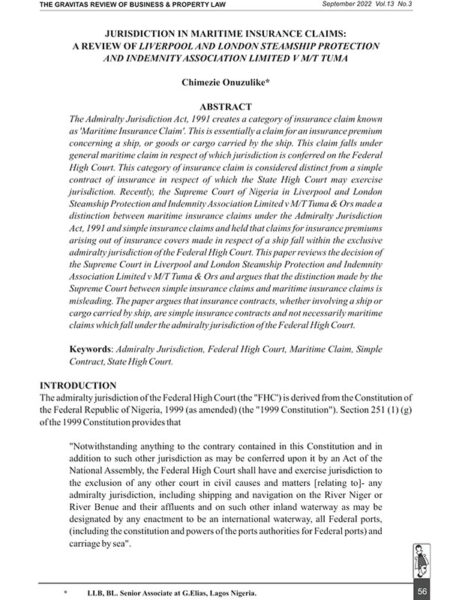
Jurisdiction in Maritime Insurance Claims: A Review of Liverpool and London Steamship Protection and Indemnity Association Limited V M/T Tuma
0₦2,500.00Chimezie Onuzulike, Senior Associate at G. Elias, in his article, Jurisdiction in Maritime Insurance Claims: A Review of Liverpool and London Steamship Protection and Indemnity Association Limited V M/T Tuma, explains that the Admiralty Jurisdiction Act 1991 creates a category of insurance claim known as ‘Maritime Insurance Claim’. This is essentially a claim for an insurance premium concerning a ship, or goods or cargo carried by the ship. This claim falls under general maritime claim in respect of which jurisdiction is conferred on the Federal High Court. This category of insurance claim is considered distinct from a simple contract of insurance in respect of which the State High Court may exercise jurisdiction. Recently, the Supreme Court of Nigeria in Liverpool and London Steamship Protection and Indemnity Association Limited v M/T Tuma made a distinction between maritime insurance claims under the Admiralty Jurisdiction Act 1991 and simple insurance claims and held that claims for insurance premiums arising out of insurance covers made in respect of a ship fall within the exclusive admiralty jurisdiction of the Federal High Court. Chimezie brilliantly reviews the decision of the Supreme Court in that case and argues that the distinction made by the Supreme Court between simple insurance claims and maritime insurance claims is misleading. He argues that insurance contracts, whether involving a ship or cargo carried by a ship, are simple insurance contracts and not necessarily maritime claims which fall under the admiralty jurisdiction of the Federal High Court.
-
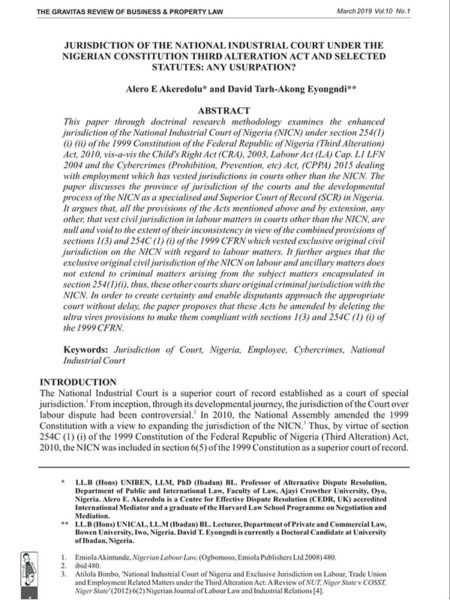
Jurisdiction of the National Industrial Court under the Nigerian Constitution Third Alteraction Act and Selected Statutes: Any Usurpation?
0₦2,500.00Professor Alero Akeredolu of Ajayi Crowther University, Oyo Nigeria and David Eyongndi of Bowen University, Iwo Nigeria in their article, Jurisdiction of the National Industrial Court under the Nigerian Constitution Third Alteration Act and Selected Statutes: Any Usurpation?, comprehensively examine the jurisdiction of the National Industrial Court. They consider whether the jurisdiction bestowed on other courts by the Labour Act, Child’s Right Act and the Cybercrimes (Prohibition, Prevention, etc.) Act in respect of employment matters contradicts the exclusive jurisdiction of the NIC under the 1999 Constitution of the Federal Republic of Nigeria (Third Alteration) Act, 2010.
The Gravitas Review of Business & Property Law



